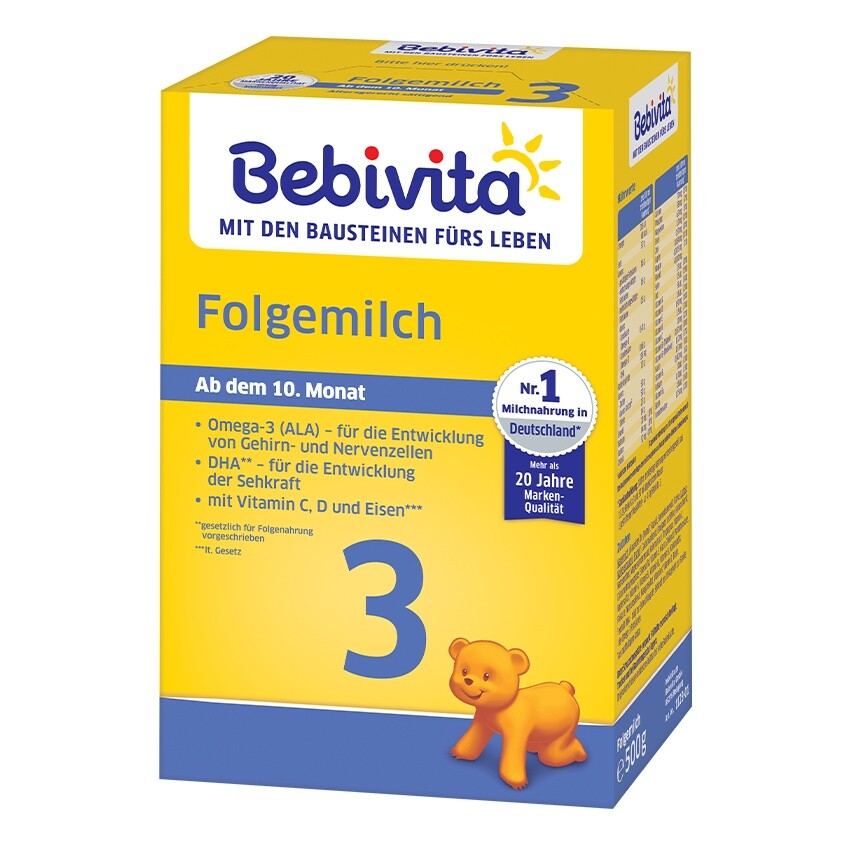Bebivita
Bebivita 3 Formula - 4 packs x 500 g
Bebivita 3 Formula - 4 packs x 500 g
Couldn't load pickup availability
Continuing milk infant formula from the end of the 9th month.
Breastfeeding is the most suitable way of feeding a child. Breast milk is the best in the first months of life - it contains everything a child needs for healthy development. After the breastfeeding period, there is Bebivita follow-on milk infant formula for babies.
Bebivita milk infant formula offers parents and their babies a high level of protection based on extensive quality controls. Each Bebivita product contains valuable nutrients (vitamins and minerals) that are adapted to the child's needs.
New recipe:
- Increasing the content of polyunsaturated fatty acids.
- Adaptation of the content of individual vitamins and minerals.
- Adjustment of energy content according to the pattern of breast milk.
- Gluten-free (by law).
- It fills you up well.
- Easily digestible.
Vitamin C, D 1 - contribute to the proper functioning of the immune system
Vitamin D 1 - contributes to the normal growth of bones and teeth
Vitamin B2 and biotin 1 - supports the proper functioning of energy metabolism
Vitamin K 1
Iodine 1 - contributes to the proper functioning of the thyroid gland
Omega-3 fatty acids (alpha-linolenic acid) – support the development of the brain and nerve cells
DHA (docosahexaenoic acid) 1 – up to the age of 1, DHA intake contributes to normal vision development
1 by law
The package contains 500 g.
Dosage and method of use
The amount of drink per bottle may vary based on individual needs. The indicated quantities of the drink and the number of bottles are indicative only. Use the included measuring cup.
- 120 ml of water and 4 scoops of milk are needed for 135 ml of prepared nutrition.
- 150 ml of water and 5 measures of milk are needed for 170 ml of prepared nutrition.
- 180 ml of water and 6 measures of milk are needed for 200 ml of prepared nutrition.
Babies need about 5 meals a day. With each new food or porridge added, one meal is lost in the bottle.
Follow exactly the instructions for preparing milk infant formula and the given recommendations. Improper preparation or storage could lead to a risk to your child's health, e.g. an increase in unwanted bacterial germs. Therefore, prepare the food fresh before each feeding. Do not reuse leftovers. Wash the bottle and all its science parts carefully. Close the opened packaging immediately after removing the product, store in a dry place at a temperature of max. 25°C and prevent temperature fluctuations. Use the product within 3 weeks of opening the package. Do not heat the food in a microwave oven (danger of scalding). Please make sure the packaging is intact before use.
Instructions for preparation:
- Freshly boil the drinking water intended for infants before each preparation and let it cool down to a temperature of approx. 40 °C-50 °C.
- Pour the prepared water into the bottle (amount according to the table).
- Lightly fill the measuring cup with the product and align it with the opposite side of the knife. Add the measured amount of the product to the bottle.
- Close the bottle and shake thoroughly.
- Cool to a temperature suitable for drinking (approx. 37°C). We will check the temperature.
Ingredients
Skimmed milk, vegetable oils (palm, rapeseed, sunflower), starch, lactose (from milk) , whey product , long chain LCP ( fish oil), calcium carbonate, emulsifier lecithin, potassium chloride, sodium citrate, carbonate magnesium, potassium salts of citric acid, L-tryptophan, sodium L-ascorbate (vitamin C), calcium salts of orthophosphoric acid, ferrous sulfate, DL-alpha tocopheryl acetate (vitamin E), nicotinamide, zinc oxide, calcium D-pantothenate, copper sulfate , retinyl acetate (vitamin A), riboflavin (vitamin B2), thiamine hydrochloride (vitamin B1), pyridoxine hydrochloride (vitamin B6), potassium iodate, folic acid, sodium selenite, manganese sulfate, phytomenadione (vitamin K), cholecalciferol (vitamin D ), D-biotin. Refers to the dried state.
Warning for allergy sufferers: contains milk, fish products.
Nutritional data of 100 ml of prepared nutrition: **Energy value (kJ / kcal) 285 / 68, Fats (of which) 3.7 g, - saturated fatty acids 1.6 g, - monounsaturated fatty acids 1.6 g, - polyunsaturated fatty acids 0.5 g, - of which linoleic acid (omega-6 fatty acid) 0.41 g, - of which alpha-linolenic acid (omega-3 fatty acid) 0.06 g, - of which docosahexaenoic acid (DHA ) 13.6 mg, Carbohydrates (of which) 7.3 g, - sugars 5.0 g, - of which lactose 5.0 g, - starch 2.3 g, Proteins 1.4 g
Minerals and vitamins: Sodium 20 mg (5%*), Potassium 84 mg (8%*), Chlorides 52 mg (10%*), Calcium 70 mg (13%*), Phosphorus 38 mg (7%*), Magnesium 6.3 mg (8%*), Iron 1.0 mg (13%*), Zinc/ 0.5 mg (10%*), Copper 0.054 mg (11%*), Iodine 15 μg (19%*) , Selenium 3.9 μg (20%*), Manganese/ 0.0075 mg (1%*), Fluorides < 0.010 mg, Vitamin A 56 μg (14%*), Vitamin D 1.6 μg (23%*) , Vitamin E 0.90 mg (18%*), Vitamin K 3.1 μg (26%*), Vitamin C 10.0 mg (22%*), Vitamin B1 0.037 mg (7%*), Vitamin B2 0 .12 mg (17%*), Niacin 0.53 mg (8%*), Vitamin B6 0.042 mg (6%*), Folic acid 10.0 μg (13%*), Vitamin B12 0.10 μg (13 %*), Pantothenic acid 0.35 mg (12%*), Biotin 1.6 μg (16%*).
*RHP - intake reference value
**Standard dilution: 13.2 g Bebivita 3 + 90 ml boiled drinking water = 100 ml prepared nutrition. 1 level measuring spoon = 4.4 g Bebivita 3.
Notice
For your baby's nutrition - Exclusive breastfeeding is ideal for your baby in the first six months. Continuing milk infant formula is not suitable as a substitute for breast milk during the first six months of life. Continuing milk infant formula is intended for children from the 9th month onwards as part of a varied diet. The decision to start solid foods, including any exception usually at six months, should only be made on the basis of the recommendation of a doctor or a person qualified in the field of nutrition, pharmacy or maternal and child care, depending on the individual growth and developmental needs of the particular infant.
For your baby's teeth - Like breast milk, infant formula also contains carbohydrates, which are an important part of your baby's nutrition. Frequent or permanent contact of the teeth with liquid containing carbohydrates can cause tooth decay and related health problems. Therefore, feed your child continuously, do not let him drink from a bottle for a long time and teach him to drink from a cup as soon as possible.
Share


